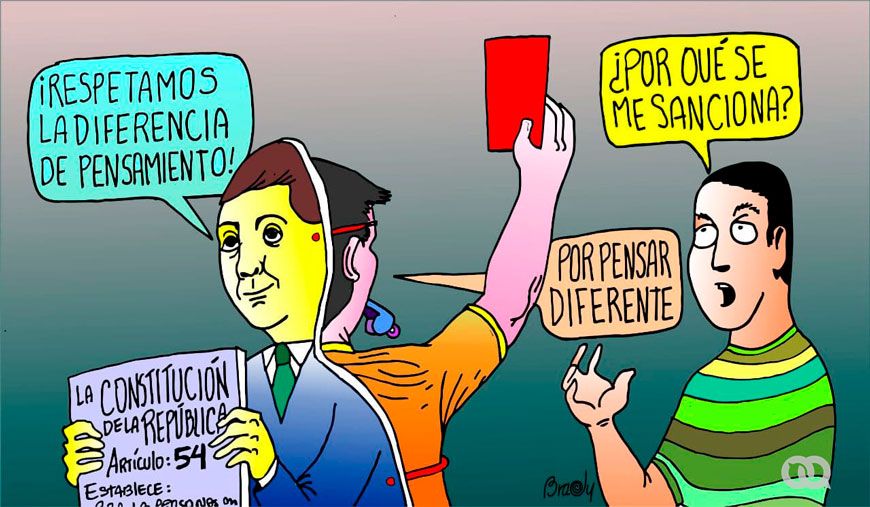Yolanda Ferrer Gomez, president of the International Relations Committee at the National Assembly of People’s Power (ANPP) said: “Nobody is punished in Cuba for their way of thinking or for speaking their mind. On the contrary, the State promotes a permanent dialogue in order for the people to really participate in the way the country is governed. In Article 54 of the Cuban Constitution, it states that the State recognizes, respects and guarantees people freedom of thought, conscience, and expression.” This statement isn’t true.
Ferrer’s claim belongs to an official Statement published on the ANPP’s website, on December 8, 2020, in response to a statement by Marie Arena, president of the European Parliament’s Subcommittee on Human Rights, who expressed this institution’s concern for the situation of members of the San Isidro Movement (MSI).
The Assembly’s Statement forms part of a smear campaign of the MSI, which Ferrer Gomez considers a “tiny group” that put into practice “a new show as part of its subversive actions against Cuba.” She also says that the “value judgements” issued by Marie Arena “have nothing to do” with Cuban reality. She addresses the president of the Subcommittee on Human Rights, telling her that she will send “additional information so that (…) she has enough facts to form a real and objective opinion.”
However, civil society has reported further violations of Article 54 of the Constitution, which Yolanda Ferrer mentions to support her argument. There are many different cases of Cubans who have been punished, strictly speaking, for expressing their opinions that go against the country’s ruling ideology.
Seven (documented) examples of ideology-based sanctions
On August 13, 2019, Martha del Carmen Mesa Valenciano, first vice-minister of Higher Education, published a document in which she outlined the institutional profile that a Cuban university professor must adhere to. Mesa says: “The person who does not identify as a revolutionary political activist of our Party, a defender of our ideology, our moral, our political convictions, should step down from being a university professor.”
Taking a look at journalist Claudia Padrón Cueto’s investigative work, reports from the Observatory of Academic Freedom and personal reports of other cases, we have compiled a list of recent examples of Cuban citizens who have been sanctioned because of the way they think. We decided to mention only seven cases, where there is public evidence of institutional resolutions which confirm the political and ideological reasons behind the sanctions applied to the affected.
- 2010: Student Eliecer Jimenez (University of Camaguey) received a two-year suspension for circulating a documentary in which he denounced the poor state of bathroom facilities in the institution he was studying at.
- 2014: Student Reinaldo Agustin Ferrer Santos was dismissed from the Faculty of Medicine in Santiago de Cuba University because of his principles and ideology, which were different to those promulgated by the Government.
- 2014: Student Jose Alberto Miniet was expelled from the University of Granma where he was studying Law. The resolution supported the decision in that “by filtering keywords, you could see that [Miniet’s] messages referred to acts, attitudes and ideological stances that are contrary to the values of a university student and a young Cuban who has been shaped by the national education system.
- 2015: Professor Boris Gonzalez Arenas was dismissed from the International Film and Television School (EICTV) for not meeting “confidentiality requirements”; this process included revoking his assignment as the Coordinator of the Comprehensive Cultural Theory Subjects Department. All of this happened because he published “articles that went against the Cuban government” on his personal blog Probidad.
- 2016: Rene Fidel Gonzalez, a PhD and professor of law at the University of Oriente was dismissed from his teaching position because he collaborated with media outlets such as Rebelion and La Joven Cuba. The University’s Board of Directors issued a statement stating that Rene Fidel “never [had], and will never have, the requirements needed to be a university professor, much less at a mambise, humanist and revolutionary university like the University of Oriente.”
- 2017: Student David Mauri Cardoso was expelled from the University of Cienfuegos because he called Fidel Castro a “dictator” during a Spanish exam and said that he hadn’t paid tribute to him after his death. The charge against him, stipulated that the student’s ideas “aren’t in keeping with our revolutionary principles”; calling the indiscipline very serious and deciding that: “David Mauri Cardoso will be Expelled from Higher Education, for adopting an attitude that goes against our revolutionary process.”
- 2017: Student Karla Maria Perez Gonzalez was expelled from the University of Las Villas. According to a statement issued by the University Student Federation (FEU), the decision was made by the first year Journalism brigade that Perez Gonzalez belonged to. It also states that: “the abovementioned student recognizes that she is a member of an illegal and counter-revolutionary organization, that goes against the principles, objectives and values of the Cuban Revolution. The university’s student body will never accept the counterrevolution within our Universities.”
Persecution based on ideology a characteristic of the Cuban political system
This isn’t a new phenomenon that we are facing. Ever since the Revolution triumphed in 1959, “ideological differences” were not only considered a crime, but an abomination.
In the early ‘60s, like Cuban writer Pio Serrano recorded, the FEU (already under revolutionary control) demanded a “cleanup” of professors at Cuban universities. This led to approximately 80% of teaching staff being laid off. They were also kicked out of cultural institutions.
In an articles published in Letras Libres, academic Abel Sierra Madero remembers that the Young Communist League encouraged students in preuniversity, with a poster, to kick out “counter-revolutionaries and homosexuals (…), [or anyone with] some kind of petit bourgeois weaknesses or who are indifferent to the student body’s revolutionary activities” from educational institutions. This was to stop them from gaining access to university and encourage their integration into the Military Service. The letter ended by saying: “apply the strength of the working and agricultural class, the strength of the masses, the right of the masses against their enemies […]. Get homosexuals and counterrevolutionaries out of our schools!”
After the first National Congress of Education and Culture in 1971, “standards” based on ideology were institutionalized. This involved a checklist of requirements that artists and intellectuals had to tick if they wanted to belong to institutions. If they didn’t, then they would be outcasts, or even thrown in jail. Ever since then, “ideological difference” became a punishable crime, although you could be punished for it beforehand too.
Academic Emilio Jose Gallardo says that Raul Castro himself accused Pensamiento Critico magazine’s editorial team for “ideological divergence”, in 1971. This led to the publication being shut down and the headquarters where they worked was demolished. This also led to Cuban poet Esteban Luis Cardenas’ dismissal from the University of Havana. Carlos Victor, another famous Cuban writer who went into exile in the ‘80s, was also kicked out of the University of Havana in 1971, accused of ideological divergence too.
Writer Nestor Diaz de Villegas was kicked out of the senior high school where he was studying in Cienfuegos, in 1974, and sentenced to 6 years in prison. Talking about his crime and details of his trial, Nestor himself has said: “they explained how I had circulated a counter-revolutionary poem among students, in which I joked about Carlos III Avenue changing its name to Salvador Allende. They reminded me that I had asked to leave from compulsory readings of Fidel’s speeches, claiming that I was bored and indifferent.”
In 1974, writer Rene Ariza was accused of a crime against the country’s safety and stability. This is what provisional conclusions from the Attorney General’s office said, recorded in the book El martillo y el espejo. Directrices de la politica cultural cubana, by Emilio J. Gallardo:
[…] he had been writing stories, essays and stories for a while now, the content and focus of which are based on a wide spectrum of ideologies and written counterrevolutionary propaganda. All of this literary material that is lacking in artistic value, written against the interests of our people, our Prime Minister Comandante Fidel Castro Ruz, martyrs of our Homeland and other leaders, was written to send outside our country and be spread, so as to incite against Socialism and international solidarity. (Almendros, Jimenez-Leal, 1984, p. 188 quoted in Gallardo, 2009, p. 251).
In 1988, during a poetry reading in Matanzas (Carilda Oliver Labra was among the participants), a group of police officers broke into the facility and beat those present because somebody had accused them of “ideological divergence.”
Rolando Prats, was the main director of the PAIDEIA project, Tercera Opcion and later for his leadership in the Cuban Democratic Socialist Current. He was kicked out of the “Jose Antonio Echevarria” Polytechnic Institute and the State Commission of Economic Collaboration, where he taught Russian. Prats himself describes it: “I was dismissed without violence, but also without any real reason, resorting to murky technicalities or reasons.”
Cesar Mora, one of the leading members of Tercera Opcion, was kicked off his degree at the State Institute of International Relations in Moscow in 1989, and taken back to Cuba by force. All of this led to Cesar requesting to be dismissed as a cadet and he refused to sign a letter supporting the speech in which Fidel Castro made his break with Gorbachov’s democratizing politics public. Shortly after arriving back in Cuba, Cesar received a resolution from the Ministry of Further Education that certified his expulsion, as he himself has said, “for counterrevolutionary activities at any Cuban university.”
This brief summary that rescues some representative cases (this is much greater phenomenon that extends to different areas and social groups) also counters Ferrer Gonzalez’s statement. We are facing a phenomon that could be called the Cuban State’s policy to control, silence and punish citizens who oppose its ideology and the socialist model of government that has been implemented in Cuba or, even against those who express their discontent support political, cultural, civil or educational changes.
This article was translated to English from the original in Spanish.










comments
We moderate comments on this site. If you want to know more details, read our Privacy Policy
Your email address will not be published. Mandatory fields are marked with *